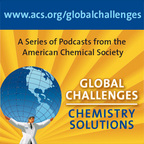
Global Challenges/Chemistry Solutions
Summary: Taking inspiration from trees, scientists have developed a battery made from a sliver of wood coated with tin that shows promise for becoming a tiny, long-lasting, efficient and environmentally friendly energy source. Their report on the device — 1,000 times thinner than a sheet of paper — appears in the journal Nano Letters.
- Visit Website
- RSS
- Artist: American Chemical Society
Podcasts:
Today’s solution is an ancient Egyptian blue pigment used 5,000 years ago. The pigment is giving modern scientists clues toward the development of new nanomaterials that could have uses in medical imaging devices, remote controls, security ink and other technologies. The report on the pigment appears in ACS' Journal of the American Chemical Society.
Today’s solution is a promising substance that could be the basis for the development of a better antidote for cyanide poisoning. This is an advance toward closing a major gap in defenses against terrorist attacks and other mass casualty events. The report, which describes a potential antidote that could be self-administered — much like the medication delivered by allergy injection pens — appears in ACS' Journal of Medicinal Chemistry.
Today’s episode describes a new process for blowing up grains of rice to produce a super-nutritious form of puffed rice. The new rice has three times more protein and a rich endowment of other nutrients that make it ideal for breakfast cereals, snack foods and nutrient bars for school lunch programs. The study is the topic of a report in ACS’ the Journal of Agricultural and Food Chemistry.
Today’s solution is a new approach for tapping biomass as a sustainable raw material for ingredients in sunscreens, perfumes and other personal care products. The approach could open up new economic opportunities for tropical countries that grow such plants. A report appears in the Journal of the American Chemical Society.
Today’s solution is a simple way to improve the sensitivity of the test often used to detect traces of explosives on the hands, carry-ons and other possessions of passengers at airport security screening stations. A group of scientists reported their innovation in ACS’ The Journal of Physical Chemistry C.
Today’s solution is an antibacterial extract from the leaves of the carob tree (the source of a popular chocolate substitute) that could fight the microbe responsible for the serious form of food poisoning called listeriosis. The research appears in ACS’ Journal of Agricultural and Food Chemistry.
Today’s report concludes that putting a speed limit on cargo ships as they sail near ports and coastlines could cut their emission of air pollutants by up to 70 percent. That would reduce the impact of marine shipping on Earth’s climate and on human health, the scientists say. Their evaluation of the impact of vessel speed reduction policies appears in ACS’ journal Environmental Science and Technology.
Today’s episode describes a study finding that the distribution system piping in U.S. public water systems that rely on non-disinfected well water or “ground water” may be a largely unrecognized cause of up to 1.1 million annual cases of acute gastrointestinal illness (AGI). That illness involves nausea, vomiting and diarrhea. The study is the topic of a report in the journal, Environmental Science and Technology.
Today’s solution is a fungus that shows promise in the search for a way to use waste corn stalks, cobs and leaves – rather than corn itself – to produce ethanol to extend supplies of gasoline. The research appears in the ACS’ journal Industrial and Engineering Chemistry Research.
Today’s report concludes that contrary to popular belief, purified drinking water from home faucets still contains bacteria. And scientists are reporting discovery of a plausible way to manipulate those populations of mostly beneficial microbes to potentially benefit consumers.
Today’s episode describes development of a new transparent solar cell, an advance toward giving windows in homes and other buildings the ability to generate electricity while still allowing people to see outside.
Today’s study could solidify the trend toward construction of gigantic windmills. In a report in ACS’ journal Environmental Science and Technology, scientists have concluded that the larger the wind turbine, the greener the electricity it produces.
Today’s report concludes that trees, bushes and other greenery growing in the concrete-and-glass canyons of cities can reduce levels of two of the most worrisome air pollutants by eight times more than previously believed. A report on the research appears in the ACS journal Environmental Science and Technology.
Today’s episode describes a potential new approach for treating urinary tract infections (UTIs) without traditional antibiotics.
Today’s solution is a new genre of electric power-generating stations that could supply electricity for more than a half billion people by tapping just one-tenth of the global potential of a little-known energy source that exists where rivers flow into the ocean.